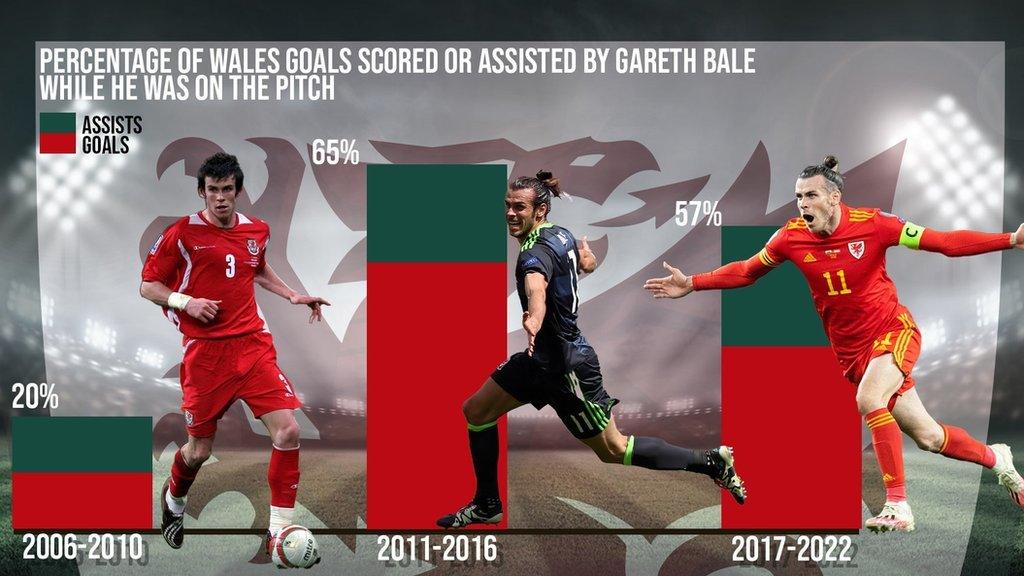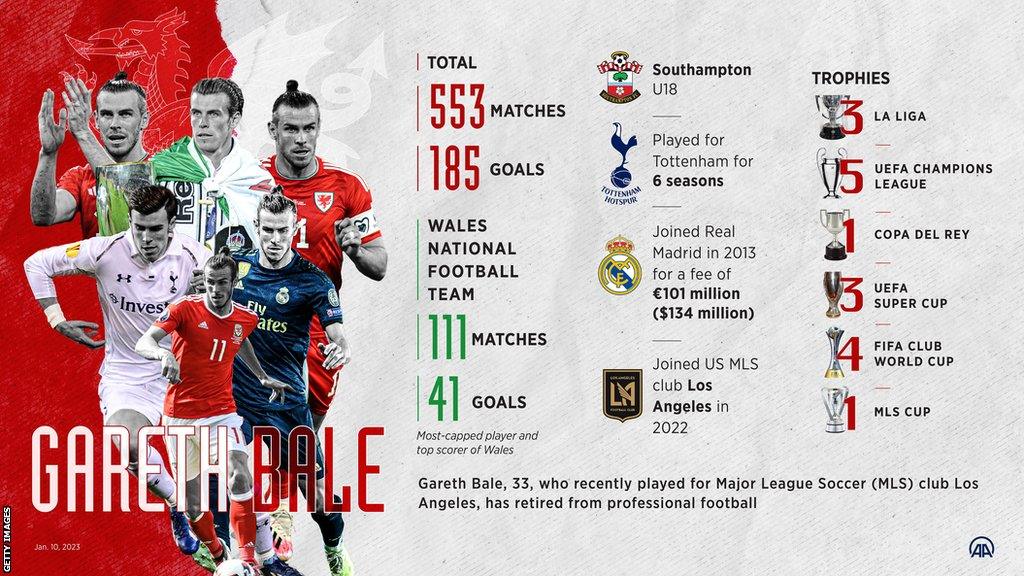Gareth Bale: A glittering Wales career in numbers
- Published

As the curtain falls on Gareth Bale's 17-year career, it is one that can only be described as the most successful and glittering in Welsh footballing history.
Before the celebrated sporting son of Whitchurch in Cardiff stepped onto the stage, Wales had only ever reached the finals of one major tournament - the 1958 World Cup.
By the time he departed, he had led the 'golden generation' to two European Championships - including the historic summer of Euro 2016 - and the 2022 World Cup.
But looking back at his career stats, just how great an influence did Bale have on the pitch? And how much of a loss will he be to the squad?
The simple facts already paint a clear picture: 111 caps, 41 goals - both records for the Wales men's team - and resounding success at club level too.
Only Cristiano Ronaldo has scored more Champions League final goals than Bale's three; the Welshman's magical winner in the 2014 Copa del Rey remains Real Madrid's only triumph in the competition in the last decade; and he departed Spain with three league titles and 81 La Liga goals under his belt.
But it was in the red of Wales that his influence was undoubtedly greatest.
Over the course of his international career he scored, on average, every 210 minutes that he was on the pitch.
His additional 22 assists mean that overall he was directly involved in a goal per 137 minutes - in other words, every game and a half.
The reliance on his goals was clear, despite grumblings when the media or rival fans occasionally referred to Wales as a 'one-man team'.
When he was on the pitch Bale scored a third of the team's goals, and his overall goal involvements contributed to over half the total.

That includes his early international career from 2006-2010 under John Toshack, when he was still developing his game and frequently played at left-back.
At his peak, from 2011-2016, he scored or assisted 65% of the goals while he was on the pitch, and even in his later years that percentage was still as high as 57%.
Put simply, if Wales needed goals, Bale was more often than not the man who would deliver them.
Other players were not as adept in stepping up when Bale wasn't available, which was more often than Wales would have liked.
Bale missed 49 internationals during his career - 31% of his total possible caps - almost all because of injury.
With Bale in the team Wales won 46% of their matches - without him, the win rate almost halved to 27%.
The difference was at its starkest during his peak years, when the team won half its games with their talisman, but only one in seven without him.
Wales scored once every 69 minutes when Bale was on the pitch - a rate which dropped to once every 129 minutes in his absence.
He was also, undoubtedly, the ultimate 'big game player'; 20 of his 41 Wales goals were result-changing, with eight of them being directly winning goals.
The most revered will always be his strike against Ukraine to take Wales to the World Cup, but crucial winners were also scored against Andorra, Belgium and Cyprus on their way to Euro 2016 qualification.
His influence also changed in later years, although the goals kept coming.
In the middle part of his career he scored 23 goals and created a further eight, but he became more creative from 2017 onwards, scoring 15 and assisting 11.
His contributions continued until the very end, too.
In the seven World Cup 2022 qualifiers in which he played, he scored six and assisted three, failing to register a contribution in only one match.
Allow X content?
This article contains content provided by X. We ask for your permission before anything is loaded, as they may be using cookies and other technologies. You may want to read X’s cookie policy, external and privacy policy, external before accepting. To view this content choose ‘accept and continue’.
His legendary set-piece prowess may be missed most of all.
Over his Wales career he scored eight free-kicks and seven penalties, including some of his most iconic - the World Cup play-off goals, his final spot-kick against the USA in Qatar, and his effort in Bordeaux which kick-started the semi-final run at Euro 2016.
The onus will now be on others to step up, with Aaron Ramsey, Kieffer Moore and Brennan Johnson all adept at penalties, and Harry Wilson a talented free-kick taker.
But none inspire the same fear in opposition players when standing over the ball that Bale did.
On the pitch, then, there is no doubt that Bale leaves a huge void.
For over a decade Wales have turned to him for goals and, when he was absent, the team - almost literally - did not win half as often.
But there are some contributions that cannot simply be measured in statistics: his influence on the squad off the field, the inspiration that he provided the nation and the wider worldwide recognition of Wales of that stemmed from his superstardom.
And so the final words fall to his final manager, Rob Page. "He's just an incredible person. Forget football for a minute, he's just an irreplaceable person.
"He has such a great presence in the changing rooms which is really important for the environment.
"He's been an absolute icon. He's a legend."
Allow X content?
This article contains content provided by X. We ask for your permission before anything is loaded, as they may be using cookies and other technologies. You may want to read X’s cookie policy, external and privacy policy, external before accepting. To view this content choose ‘accept and continue’.

LEGENDS OF WELSH SPORT: Some of the greatest and most inspiring stories in Welsh football
TOGETHER STRONGER: The transformation of the Wales football team
